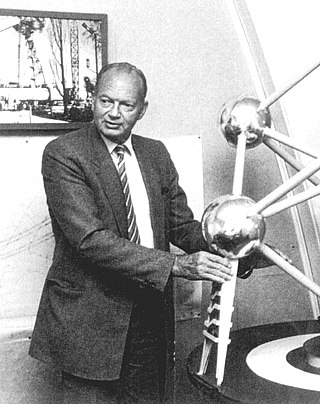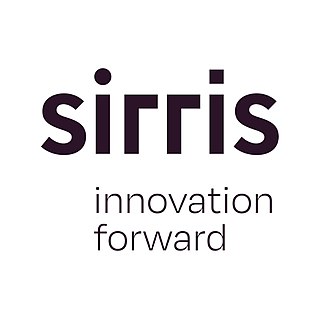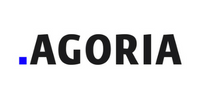The Open University of the Netherlands is a Dutch institution for distance learning at university level. It is an independent government-funded university and uses a variety of methods, including written materials, the Internet, and occasional evening seminars or day sessions.

André Waterkeyn was a Belgian engineer, born in Wimbledon, London, best known for creating the Atomium.
The Federation of Enterprises in Belgium is the only Belgian non-profit organization representing companies in all three regions of Belgium. Its members, the different Belgian sectorial employers' organizations, represent companies in key industrial and service sectors. All in all, it represents more than 30,000 businesses, of which 25,000 are small or medium-sized enterprises. Since May 2012, Pieter Timmermans is CEO of the Federation of Belgian Enterprises, and since March 2017, Bernard Gilliot of Tractebel is the President.

VIB is a research institute located in Flanders, Belgium. It was founded by the Flemish government in 1995, and became a full-fledged institute on 1 January 1996. The main objective of VIB is to strengthen the excellence of Flemish life sciences research and to turn the results into new economic growth. VIB spends almost 80% of its budget on research activities, while almost 12% is spent on technology transfer activities and stimulating the creation of new businesses, in addition VIB spends approximately 2% on socio-economic activities. VIB is member of EU-LIFE, an alliance of leading life sciences research centres in Europe.
The Flemish Institute for Technological Research, is an independent Flemish research organisation that provides scientific advice and technological innovations that facilitate the transition to a sustainable society, and this in the areas of energy, chemistry, materials, health and land use.
flanders.bio, founded in 2004, is the networking organisation for the life sciences sector in Flanders and represents and supports around 350 member companies. The key strategic objectives of flanders.bio are knowledge exchange and valorisation, human capital development, internationalization of the cluster activities and visibility, familiarization of the public with products derived from the sector and the further development of a supportive environment for the members of flanders.bio.
The Agency for Innovation by Science and Technology was a Flemish agency between 1991 and 2015. It was an externally autonomized agency of the Flemish Government, in charge of innovation policy in Flanders and located in the Ellipse-Building in Brussels.
iMinds was a Flemish non-profit organization, founded by the Flemish Government. It was founded as a research institute, with a focus on information & communication technology (ICT) in general, and applications of broadband technology in particular. iMinds offers companies and organizations active support in research and development. It brings together companies, authorities, and non-profit organizations to join forces on research projects.
Flanders District of Creativity or Flanders DC is a non-profit organization founded by the Flemish government, on 7 May 2004, centered around the design and fashion sector.

Technopolis is a Flemish technology education centre located near Mechelen.
The Vlaams Economisch Verbond (VEV) is a Flemish employers' organization and lobbying group.
André Leysen was a Belgian businessman. In 1951, he married Anne Ahlers, daughter of a shipping family from Bremen, Germany. Together they have four children: Bettina, Christian, Thomas, and Sabina.
The Walloon Union of Companies or Union Wallonne des Entreprises (UWE) is the Walloon employers organization.
Science and technology in Flanders, being the Flemish Community and more specifically the northern region of Belgium (Europe), is well developed with the presence of several universities and research institutes. These are strongly spread over all Flemish cities, from Kortrijk and Bruges in the Western side, over Ghent as a major university center alongside Antwerp, Brussels and Leuven to Hasselt and Diepenbeek in the Eastern side.
World Steel Association, abbreviated as worldsteel, is the international industry association for the iron and steel sector. The association is one of the largest and most dynamic industry associations in the world, with members in every major steel-producing country. worldsteel represents steel producers, national and regional steel industry associations, and steel research institutes. Members represent around 85% of global steel production.
Orgalim represents Europe’s technology industries, comprised of 770,000 companies that innovate at the crossroads of digital and physical technology. Our industries develop and manufacture the products, systems and services that enable a prosperous and sustainable future.

Sirris is a non-profit scientific organisation in Belgium. It is an important collaborative centre for the Belgian technology industry. Until 2007, Sirris was known as CRIF-WTCM, which was founded in 1949 by Fabrimetal.

UNIZO is a Belgian association of entrepreneurs, Small and Medium Sized Enterprises (SME); it is mainly situated in the Flemish region of the Kingdom of Belgium.
The Belgian Chamber of Translators and Interpreters is a non-profit professional association that was founded on April 16, 1955 in Brussels. The Chamber works to advance the profession and the recognition of specific skills and abilities of translators and interpreters in Belgium. It seeks to make players and users of translation and interpretation services more aware of the importance of quality and responsibility.
Science and technology in Kazakhstan – government policies to develop science, technology and innovation in Kazakhstan.





